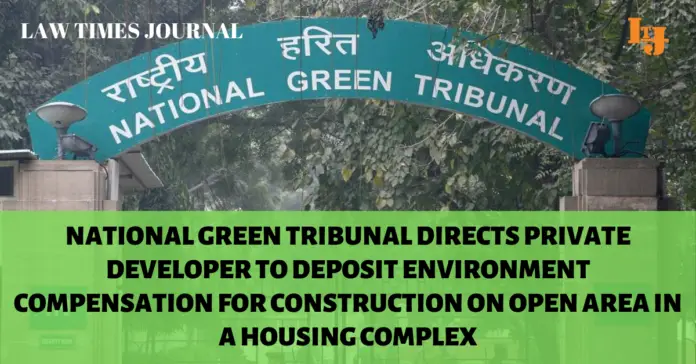
National Green Tribunal
The National Green Tribunal has been established on 18.10.2010 under the National Green Tribunal Act 2010 for effective and expeditious disposal of cases relating to environmental protection and conservation of forests and other natural resources including enforcement of any legal right relating to environment and giving relief and compensation for damages to persons and property and matters connected therewith or incidental thereto. It is a specialized body equipped with the necessary expertise to handle environmental disputes involving multi-disciplinary issues.
Before The National Green Tribunal Principal Bench, New Delhi
Applicant: Anil Uppal & Ors.
Respondent: U.O.I. & Ors.
Coram: Hon’ble Mr. Justice Adarsh Kumar Goel, Chairperson Hon’ble Mr. Justice S.P Wangdi, Judicial Member Hon’ble Dr. Nagin Nanda, Expert Member Hon’ble Mr. Siddhanta Das, Expert Member
Facts and issues of the case:
The National Green Tribunal on Friday 17th January directed a personal developer to deposit Rs 68, 51,250 as a compensation with the Central pollution control panel for construction during an open area in development.
The Hon’ble bench headed by Chairperson Justice Adarsh Kumar Goel who gave the directions while hearing the plea filed by Anil Upal, all the residents of Ambiance Lagoon Apartments, a housing complex on Gurgaon Haryana On National Highway Number 8.
The private developer of the housing complex has got to deposit the amount within one month as directed within the order of the court. The tribunal said any approval granted without considering the impact on the environmental rights of persons to whom the flats were allotted is against the Sustainable Development and Precautionary Principles required to be enforced by it. “Powers of regulatory authorities was required to be exercised per these principles.
The Environmental Impact Assessment procedure was required to be duly followed. The deed of Declaration filed by the builder in 2009 showed the planet to be an open area which was the thought on which the flats were allotted before 2010,” the bench said.
The NGT said, “Out of 10.98-acre land which was meant for the project in question, only 7.93-acre land was used and remaining 3.05-acre land, which was open area, was converted into covered area for an ad tower, irreversibly removing the rights to ecological services of the persons to whom the flats were allotted.”
The order came after perusing a report filed by the Ministry of Environment, and Forests and global climate change (MoEF) making an assessment of Rs 68,51,250 to be paid as environmental compensation.
The tribunal was hearing a plea filed by Gurgaon residents Anil Uppal seeking action against the builder for construction on the green/open area during a housing complex. According to the applicants, Ambience Lagoon Apartment was a housing complex at National Highway No. 8, Gurgaon, Haryana developed by Respondent No. 6, Ambience Developers & Infrastructure Private Limited. “Open areas within the colony are shrinking spring water extraction was excessive. Air quality was getting deteriorated. The builder had undertaken construction on designed open spaces, blocking fresh air and sunlight. The approved zoning plans required maintaining a minimum of 15 per cent of the whole area as open space. National code of India, 2005 also requires minimum horizontal space between the existing building and thus the new building.”
Order:
Any approval granted without considering the impact on the environmental rights of the persons to whom the flats were allotted is against Sustainable Development and Precautionary Principles required to be enforced by this Tribunal. Powers of regulatory authorities were required to be exercised per these principles.
EIA procedure was required to be duly followed. The deed of Declaration filed by the builder in 2009 showed the area to be an open area which was the basis on which the flats were allotted before 2010. After allotment of the said flats, the open area was converted into a covered area on the ground that open area will be shown at different locations in the integrated project without considering the rights of the allottees. Out of 10.98-acre land which was meant for the project in question, only 7.93-acre land was used and remaining 3.05-acre land, which was an open area, was converted into a covered area for a commercial tower, irreversibly taking away the rights to ecological services of the persons to whom the flats were allotted. The applicant has also made a point on the inadequacy of the compensation and about the compensation not covering the issues already raised in these proceedings, particularly loss to ecological services on account of illegal commercial constructions in open areas.
Illegal benefit taken by the builder was required to be quantified and recovered which has not been done. Alternatively, the area needs to be restored, after demolishing illegal constructions. While the recommended environmental compensation may have to be recovered as an interim compensation and may be deposited within one month with the CPCB by Respondent No. 6, the further question of whether illegal construction is to be demolished or the compensation quantified may need to be gone into.
We permit the parties to file written submissions specifying questions for the constitution of an appropriate Expert Committee to go into the matter with their respective precise submissions. The same may be filed by the applicant within one week from today and by the respondents within one week thereafter. Oral arguments stand concluded.
Edited by Vartika Gajendra Singh
Approved & Published – Sakshi Raje
References:
1. https://ngtonline.nic.in/newsite/
2. http://www.greentribunal.gov.in/Home.aspx
3. http://www.greentribunal.gov.in/judge_courtI.aspx





